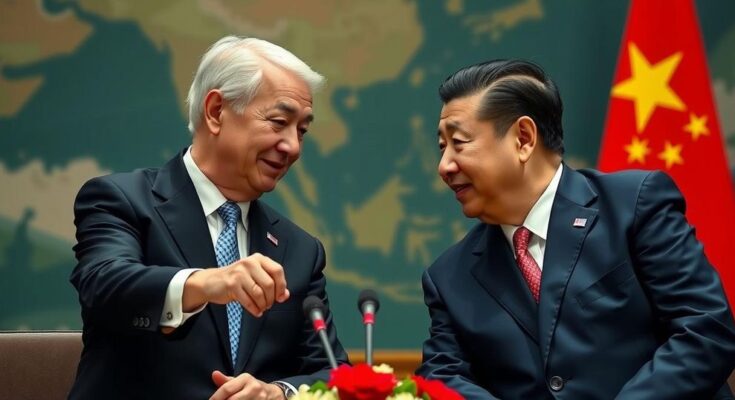During the APEC summit, President Biden and President Xi held their anticipated final meeting, discussing the implications of the incoming Trump administration on U.S.-China relations. Key topics included North Korea’s support for Russia, human rights issues, and the necessity for ongoing communication to prevent conflict. Xi expressed readiness to cooperate with the new U.S. administration, highlighting the critical need for stability in the bilateral relationship.
On the sidelines of the APEC summit in Lima, Peru, U.S. President Joe Biden and China’s President Xi Jinping held what is expected to be their final meeting. During their discussions, Xi expressed a readiness to work with the incoming Trump administration, addressing potential future challenges stemming from protectionist policies. Biden emphasized the importance of candid communication to avoid conflict, while urging Xi to encourage North Korea to refrain from supporting Russia in its war against Ukraine, a topic of concern due to North Korea’s military assistance to Moscow.
The dialogue between the two leaders encompassed various pressing issues, including human rights, technology, and the situation regarding Taiwan. Xi’s remarks underscored a desire for cooperation, contrasting sharply with the uncertain climate surrounding U.S.-China relations under Trump, who has previously indicated a willingness to impose tariffs on Chinese imports.
While Xi cautioned that a stable relationship between the two countries is crucial for global well-being, Biden reflected on the lengthy engagement between them over the years, noting both the successes and the challenges faced. They discussed the implications of China’s support for Russia and renewed tensions surrounding North Korea, which has intensified missile testing activities and military cooperation with Russia, deemed dangerous by Biden and his allies.
The relationship between the United States and China has historically been complex, encompassing significant areas of cooperation and profound disagreements. High-level meetings between leaders of both nations aim to stabilize ties, especially in light of growing competition and geopolitical tensions. As the U.S. approaches a transition in administration, particular concerns have been raised regarding potential shifts in policy, especially related to trade and military dynamics. Xi Jinping’s leadership focuses on asserting China’s presence globally, while the Biden administration seeks to balance competition with constructive dialogue, particularly regarding North Korea and China’s ties with Russia amidst escalating international conflicts.
The final meeting between President Biden and President Xi marks a pivotal moment as both leaders reflect on their past interactions and the looming uncertainties of future relations under a Trump presidency. Their discussions highlighted mutual recognition of the need for a stable U.S.-China relationship, even as they navigate significant global challenges, including North Korea’s actions and China’s role in Russia’s war efforts. As new leadership approaches in the U.S., the outcomes of this engagement will likely influence the trajectory of international diplomacy in the Asia-Pacific region.
Original Source: www.pbs.org




